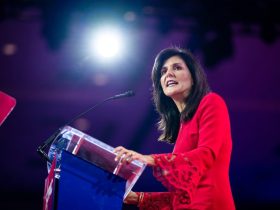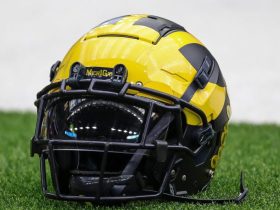Florida Gov. Ron DeSantis has been working with one of the most sought-after Republican debate coaches as he aims for a much-needed momentum shift after months of struggles. He has distanced himself from an allied super PAC recommending he defend former president Donald Trump against attacks onstage and is under pressure to quiet growing doubts from donors about his ability to defeat the former president.
Mike Pence, who has spoken out against Trump’s efforts to overturn the 2020 election, says he is aiming to reintroduce himself, as his allies hope he demonstrates his experience on the world stage. Chris Christie, who played both Hillary Clinton and Joe Biden in Trump’s past debate preparations, is now gearing up for what supporters hope will be a forceful case against the ex-president.
And Trump, the dominant polling leader in the Republican race, plans to skip the debate altogether, questioning why he would show up against rivals who are trailing far behind him. Advisers to several campaigns said their debate preparations encompassed two scenarios — how to deal with a last-minute appearance if he changes his mind and how to capitalize on Trump’s absence if he doesn’t.
All of which makes for a most unusual first debate of the Republican primary, an event regarded as the unofficial kickoff to the fall campaign — one that could draw tens of millions of viewers, and mark the first time many voters will be tuning in closely. After a race that has been in some ways static this summer, with Trump leading the pack as he faces four criminal indictments, DeSantis running a distant second and losing ground and everyone else bunched together below them in the polls, at least eight expected participants have an opportunity for a reset, including former Arkansas governor Asa Hutchinson, who qualified Sunday.
Trump and other candidates have until Monday night to prove they have met the criteria for participating, including by signing a pledge to support the GOP nominee — which Trump has scorned — and meeting certain fundraising and polling metrics. Even if he skips the debate as planned, Trump’s presence in the race looms over the event.
After a months-long stretch when Trump’s legal woes have attracted widespread attention, Fox News moderators Bret Baier and Martha MacCallum have signaled that they plan to press the candidates for their opinions on Trump’s alleged crimes. And the attention normally bestowed on the standout performer could be cut short — because Trump faces a Friday deadline to surrender in Fulton County, Ga., where he and 18 others were charged with crimes related to his efforts to overturn the 2020 election results.
Veteran Republican strategist Mike Murphy argued that GOP voters seeking an alternative to Trump will be looking for the contender who addresses the totality of the crimes he stands accused of and how those legal travails could harm the party’s chances of winning back the White House.
“If they roll over and purr, then they are kittens, not candidates,” Murphy said. “How do you beat the lion without engaging him?”
But another Republican strategist aligned with one of the candidates said the decision about how much to focus on Trump is a fraught one. “If he’s not there and you’re talking about him, are you just yelling into space?” said the strategist, who like others spoke on the condition of anonymity to more candidly discuss strategy.
Instead of attending the debate, Trump plans to release an already recorded interview with former Fox News host Tucker Carlson, according to a person briefed on the matter. He wrote on social media Sunday that he will “NOT BE DOING THE DEBATES.”
Trump has also lined up counterprogramming by dispatching a coterie of advisers and surrogates to the debate, including Kari Lake, the former Arizona gubernatorial candidate; Sen. J.D. Vance of Ohio; and Reps. Byron Donalds and Matt Gaetz of Florida.
Polling has illustrated both the challenge and the opportunity that Trump’s GOP rivals face in Milwaukee as they try to dislodge the former president’s grip on the Republican base. A recent Associated Press-NORC Center for Public Affairs research poll — conducted before the Georgia indictment — showed that seven in 10 Republicans view Trump favorably and about six in 10 say they want him to run for the White House. The AP-NORC poll also found that 53 percent of Americans said they would definitely not support Trump in 2024 if he is the GOP nominee.
In part because of concerns about Trump’s electability, part of the target audience for the Republican contenders Wednesday night is not just GOP voters, but wealthy donors who are still on the sidelines — surveying the field while skeptical that any of the candidates have what it takes to topple Trump.
“I know a number of donors who have not made commitments yet, who are waiting to see what happens in this debate,” said Lanhee Chen, a former adviser to 2012 presidential nominee Mitt Romney and three other presidential campaigns.
While DeSantis entered the race as the best-funded challenger to Trump, he is under scrutiny within the donor class because of his failure to meet the high expectations set for his candidacy. That has created an opening for rivals to woo donors who are losing interest in DeSantis — and Trump’s absence on the debate stage gives them a chance to make their case.
But the varying advice from DeSantis’s allies about what his Milwaukee strategy should be has exemplified how difficult that task is. Memos posted to the website of Axiom Strategies, a firm affiliated with the pro-DeSantis super PAC Never Back Down, advised the Florida governor to defend Trump if and when candidates like Christie attack him onstage, while taking a “sledgehammer” to another rising Republican primary candidate, Vivek Ramaswamy. (Under federal rules, super PACs cannot directly coordinate with the candidate but often work around the rules by posting opposition research and strategy documents online).
Ken Cuccinelli, Never Back Down’s founder, said Sunday on CNN it was a mistake to post the memos, which drew ridicule from rivals — and instantly made it harder for DeSantis to use any of the lines they suggested.
In an interview in New Hampshire this past weekend, DeSantis dismissed the debate strategy memo posted at the Axiom website, stating that he hadn’t read it. He also made it clear that he plans to punch back Wednesday night. He is working with Brett O’Donnell, a well-regarded GOP debate specialist.
“If you look really in the last six to nine months, I’ve been more attacked than anybody else,” DeSantis told Fox News. “People know that I’m the biggest threat. So, we view it as positive feedback. We’ll be ready to do what we need to do to deliver our message.”
DeSantis’s newly installed campaign manager, James Uthmeier, sent “messaging guidance” this weekend to “friends, donors and supporters,” stating that the team expects the Florida governor to be “the center of attacks” in what they define as a two-man race between DeSantis and Trump. The campaign has told donors DeSantis will be focused on communicating “a vision to beat Joe Biden.”
DeSantis’s campaign has also been blasting out regular emails and texts promoting the debate to supporters, sometimes taking thinly veiled swipes at Trump.
“I will debate about the issues,” read a bolded, underlined paragraph in a Wednesday fundraising email focused on the debate. “I won’t insult somebody, their looks, or how they dress … I wouldn’t teach my kids to treat people any differently than they want to be treated themselves, so I will set that example.”
DeSantis also took a shot at Trump in an interview with The Florida Standard when he was asked why some Trump supporters have attacked him as a Republican in name only — subsequently facing blowback from Trump campaign officials and allies for appearing to suggest that some of the former president’s supporters were “listless vessels” who simply carry whatever message he delivers on Truth Social, his social media platform. The DeSantis campaign sought to clarify the comments amid a torrent of criticism, with spokesman Bryan Griffin suggesting the governor was talking specifically Trump and some of his endorsers in Congress, not other followers.
Beyond DeSantis, one other candidate several strategists in other campaigns are eyeing is Ramaswamy — a technology entrepreneur and political newcomer they say is also likely to be a target on Wednesday night. Advisers to several candidates, who spoke on the condition of anonymity to discuss internal deliberations, said the stage will likely serve as a venue to litigate the inconsistencies in Ramaswamy’s policy statements.
Ramaswamy, a millennial who is running as a next iteration of Trump, has often extended a friendly hand to the former president, who has responded in kind. He recently said that he sees the debate as a chance to introduce himself to the country and that he has no issues with the former president skipping the debate — a departure from his position in May when he said in a Fox radio interview that it would be “fundamentally uncourageous” for Trump to refuse to debate.
For Christie, who has plenty of experience helping others in debate prep, there is no role-playing in his own preparations for a stage that could be large and unwieldy. Instead, the former New Jersey governor is diving into policy briefs, seeking advice from a few trusted advisers and avoiding any exercise that might lead to answers that seem too rehearsed.
Pence said he feels as though he’s been “debating all my life” because of his lengthy experience in government as vice president, the governor of Indiana and a conservative leader in Congress. He has criticized Trump’s conduct in the lead-up to the riot at the Capitol on January 6, 2021 — a topic that is all but certain to come up on Wednesday night.
“It’s going to be an opportunity for us to reintroduce ourselves to the American people,” he said. “I never forget, having done a couple of these national televised debates, it’s not so much about who you’re talking to on the stage, it’s about who you’re talking to across the country. My hope, and frankly our prayer, is going to be the American people get a fresh look at the Pences.”
Trump’s strength among rank-and-file GOP voters has been one of the most difficult things for rivals such as Sen. Tim Scott (R-S.C.) and Nikki Haley, Trump’s former ambassador to the United Nations, to navigate. While walking through the Iowa State Fair earlier this month, Scott told reporters that his strategy will be to present himself as “an optimistic, positive guy anchored in conservatism.”
As past members of Trump’s administration, Haley and Pence might have to explain to voters on Wednesday night why they can execute Trump’s policies better than the former president himself. Haley said she has prepared for the Milwaukee debate by doing dozens of town halls in Iowa, New Hampshire and South Carolina — letting “everybody ask whatever questions they want.”
“They’ve asked the hard questions, we’ve given the answers and I think that’s the prep that we needed to get on the debate stage,” she told The Post.
Doug Burgum, the little-known governor of North Dakota, is another wild card on the stage who hopes voters will embrace his combination of business and executive experience as the governor. “We’re not locking ourselves in a closet memorizing lines, we’re going to keep on talking to people about the things that matter to them right up until the time that we get to Milwaukee,” he told The Post.
Hutchinson — who asked donors to help him qualify for the debate so he could make the case that Trump has disqualified himself from holding the nation’s highest office — said Sunday that he had surpassed the requisite 40,000-donor threshold. A person familiar with the RNC’s process confirmed that Hutchinson has qualified.
Josh Dawsey and Isaac Arnsdorf contributed to this report.








